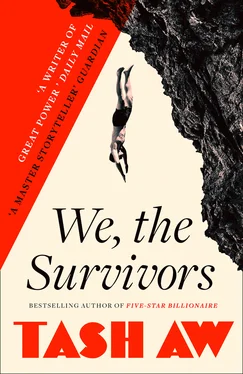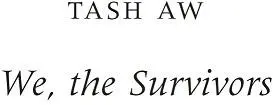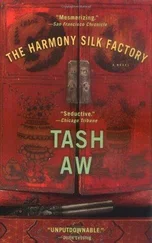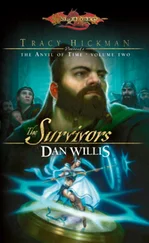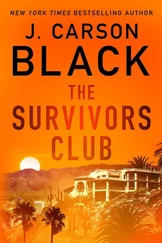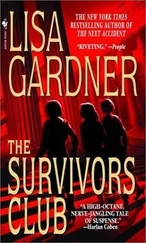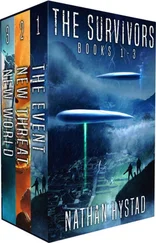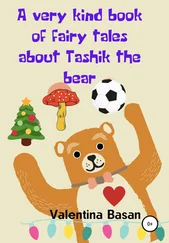
4th Estate
An imprint of HarperCollins Publishers
1 London Bridge Street
London SE1 9GF
www.4thEstate.co.uk
This eBook first published in Great Britain by 4th Estate in 2019
Copyright © Tash Aw 2019
Design by Jack Smyth. Figure © Plainpicture/Saam Riwa. Texture: Upsplash.
Tash Aw asserts the moral right to be identified as the author of this work
A catalogue record for this book is available from the British Library
Information on previously published material appears here.
All rights reserved under International and Pan-American Copyright Conventions. By payment of the required fees, you have been granted the non-exclusive, non-transferable right to access and read the text of this e-book on-screen. No part of this text may be reproduced, transmitted, down-loaded, decompiled, reverse engineered, or stored in or introduced into any information storage and retrieval system, in any form or by any means, whether electronic or mechanical, now known or hereinafter invented, without the express written permission of HarperCollins
Source ISBN: 9780008318581
Ebook Edition © March 2019 ISBN: 9780008318567
Version: 2019-12-22
For Francis
‘Here we received the first blows: and it was so new and senseless that we felt no pain, neither in body nor in spirit. Only a profound amazement: how can one hit a man without anger?’
Primo Levi, If This is a Man
Contents
Cover
Title Page
Copyright
Dedication
Epigraph
I. October
October 2nd
October 4th
October 6th
October 10th
She sits and …
October 13th
She stares at …
October 15th
The thought comes …
October 19th
I recognise the …
October 24th
II. November
November 2nd
Bang bang bang. …
November 5th & 6th
Let’s go out, …
November 7th
III. December
December 4th
I’m writing a …
December 7th
December 9th
Every time we …
December 12th
What strikes me …
December 15th & 16th
A noise. Nothing …
December 20th
You’ve been smoking.
December 30th
But it’s illegal, …
IV. January
January 2nd
The drive is …
About the Author
By the same Author
About the Publisher
I
October 2nd
You want me to talk about life, but all I’ve talked about is failure, as if they’re the same thing, or at least so closely entwined that I can’t separate the two – like the trees you see growing in the half-ruined buildings in the Old Town. Roots clinging to the outside of the walls, holding the bricks and stone and whatever remains of the paint together, branches pushing through holes in the roof. Sometimes there’s almost nothing left of the roof, if you can even call it that – just fragments of clay tiles or rusty tin propped up by the canopy of leaves. A few miles out of town, on the other side of Kapar headed towards the coast, you’ll find a shophouse with the roots of a jungle fig creeping down the front pillars of the building, the entire structure swallowed up by the tree – the doorway is now just a shadowy space that leads into the heart of a huge tangle of foliage. Where does one end and the other begin? Which one is alive, which is dead? Still, on the ground floor of these houses, there’ll be a business or a shop, some kind of small operation, an old guy who’ll patch up your tyres for twenty bucks. Or a printing press that makes those cheap leaflets advertising closing-down sales at the local mall. Or a cake shop with nothing in the chiller cabinets except for two pieces of kuih lapis that have been there for three weeks. The packets of biscuits on the shelves are covered in the dust that drifts across from the construction sites nearby, where they’re building the new railway or shopping mall or God knows what. These people haven’t made a decent living for twenty years. They’re seventy-five, eighty years old. Still alive, but their business is being taken over by a tree. Imagine that.
That night, after the killing – or the culpable homicide not amounting to murder , as you politely call it – I walked for many hours in the dark. I can’t tell you how long. I tried to hang on to a sense of time, kept looking at the sky for signs of dawn, I even quickened my stride to make each step feel like one full second, like the ticking of that clock on the wall over there, that right now sounds so quick. Tick, tick, tick. But that night each second stretched into a whole minute, each minute felt like a lifetime, and there was nothing I could do to speed things up.
My shirt was wet – not just damp, but properly wet – and it clung to my back like a second skin; only that skin did not belong to me, but to a separate living organism, cold and heavy, weighing me down. As I walked further and further away from what I now come to think of as the scene of the crime (but didn’t then – it was just a darkened spot on the riverbank, indistinguishable from any other), I listened out for the sirens of police cars, expecting to hear them at any moment. I kept thinking, They’re coming for me, this is the end, the mata are going to catch me and throw me in jail forever. I said out loud, You’re finished. This really is the end for you . Hearing my own voice calmed me. Nothing had ever felt so absolute and certain. The police would arrive, they would lock me up, and from then on, all my days would be the same. The thought of being in a small empty cell with nothing to think about for the rest of my life – the idea of this existence comforted me. When I woke up each morning I would see the same four walls that had been there when I fell asleep the night before. Nothing would ever change. What I wore, how long I slept each night, how many times a day I could eat, wash, shit – every decision would be made for me, I would be just the same as everyone else. Someone would take control of my life, and that would be the end of my story. Part of me still wishes things had turned out that way.
I walked through the long grass – it was stringy and sharp and slashed my legs right up to my knees. It was hot, I was wearing shorts, my skin started to sting. Twice, maybe three times, I crossed a bridge and continued to wander along the opposite bank. At first I was looking for my car, but soon I realised I was trying to get as far away from the scene of the crime as possible. The only problem was that I couldn’t remember exactly where it had happened. At some point I started to feel mud between my toes and I realised I’d lost one sandal, which must have got stuck in the swampy ground, so I kicked off the other and walked barefoot. It was late, but not so late that there wasn’t any traffic on the highways beyond, and on the bridges overhead. Their headlamps would sometimes illuminate the tops of the trees above me, and suddenly little details would leap out at me, things I wouldn’t have noticed if I’d been walking there in the daytime – kites with smiley bird faces snagged in the branches, or plastic bags, lots of them, hanging like swollen ghostlike fruit.
Sometimes I’d see strange shapes drifting in the middle of the river. Fallen tree trunks and bushes uprooted by the storms upstream, tangled together in huge rafts that looked like some sort of mythical beast from Journey to the West , the kind of nonsense that adults tell children to scare them into behaving themselves, but that no one actually takes seriously, not even children – what kid actually believes in a nine-headed bug? – until one night they’re walking alone on a riverbank, and then those demons seem real and terrifying. Other times, snagged in the reeds right by where I was walking, I’d see a dead creature, a body so bloated that I couldn’t even tell what it was – a could-be cat or a could-be monkey. When a body’s been in the water for that long, its shape starts to blur, softening around the edges until it becomes impossible to distinguish one kind of animal from another.
Читать дальше
